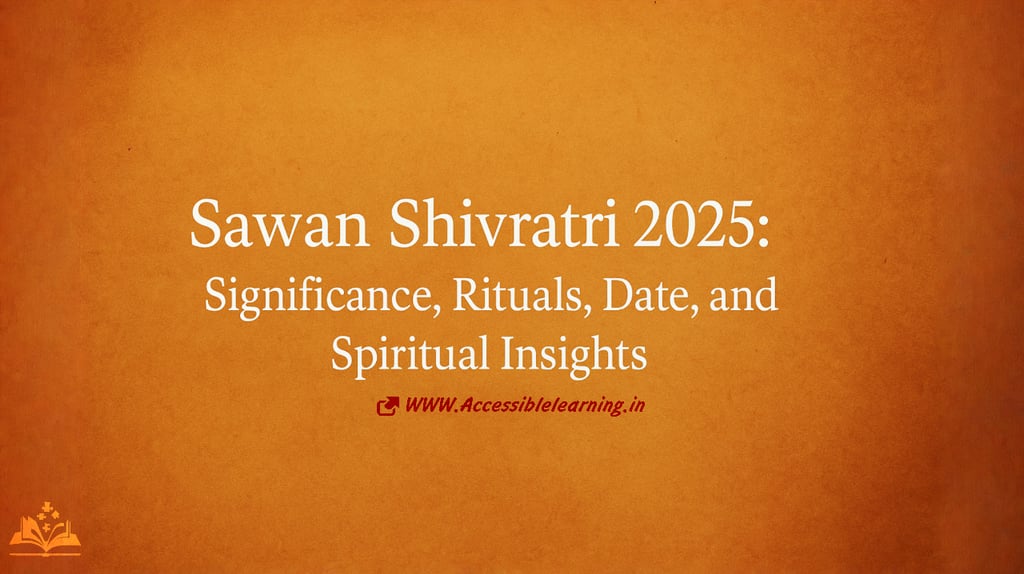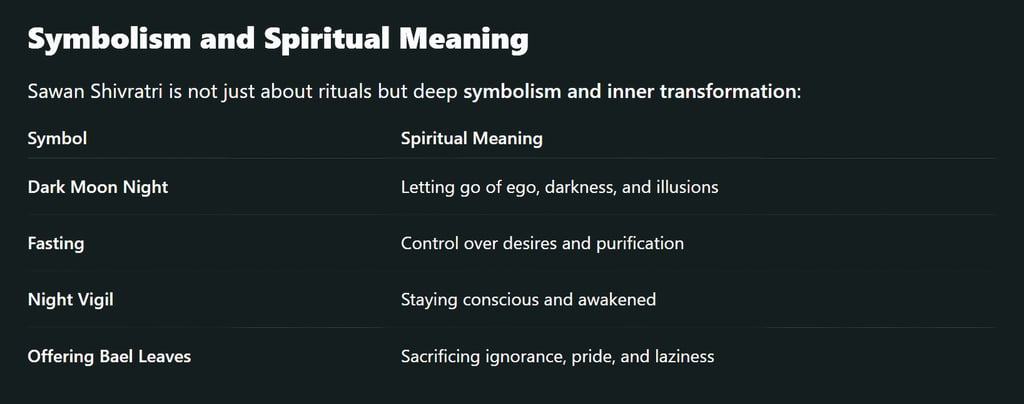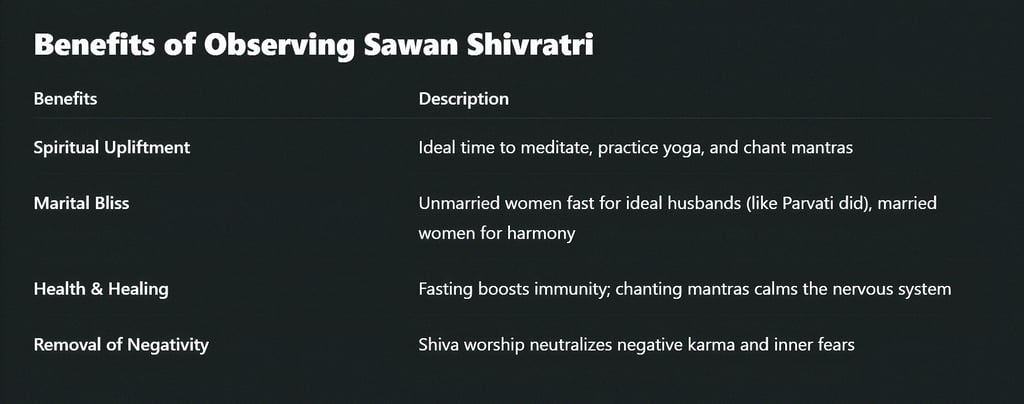
Sawan Shivratri 2025: Significance, Rituals, Date, and Spiritual Insights
Discover the spiritual significance, rituals, and fasting rules of Sawan Shivratri 2025. Learn why this sacred night dedicated to Shiv Ji is so important in the holy month of Shravan. Perfect for spiritual seekers and Hindu devotees.
CULTURE/TRADITIONINDIA/BHARATCELEBRATION/FESTIVALS
Keshav Jha
7/16/20255 min read


Sawan Shivratri, also known as Masik Shivratri of Shravan month, is one of the most auspicious nights dedicated to Shiv Ji. While Shivratri occurs every lunar month, Sawan Shivratri holds exceptional spiritual significance because it falls in the holy month of Shravan (July–August)—the month considered dear to Shiv Ji.
In 2025, Sawan Shivratri will be observed on Sunday, July 20.
The day unites devotion, fasting, meditation, and spiritual awakening, attracting millions of devotees across India and Nepal. It is especially important for Shiv bhakts, Kanwariyas, and those seeking blessings for marital bliss, health, and spiritual growth.
Why Is Sawan Shivratri So Special?
Shravan is regarded as the holiest month in the Hindu calendar due to its deep connection with Vedic scriptures, Shiv Purana, and ancient Himalayan traditions. Here's why Sawan Shivratri is highly revered:
The Month of Shiv
According to Hindu texts, during the Samudra Manthan (churning of the cosmic ocean), a lethal poison named halahala emerged.
Lord Shiva consumed the poison to save the universe and held it in his throat, turning it blue—hence the name Neelkantha.
This act of cosmic sacrifice happened in the month of Shravan, making it sacred for Shiva worship.
Masik Shivratri Meets Shravan Energy
Shivratri falls on the 14th night of the waning moon (Krishna Paksha Chaturdashi) each month.
But the Sawan Shivratri is supercharged with spiritual energies due to the monsoon season, planetary alignments, and cosmic tides favoring intense sadhana and worship.
Date & Timings of Sawan Shivratri 2025
Date: Sunday, July 20, 2025
Nishita Kaal Puja Time (Midnight Puja): 12:04 AM to 12:50 AM (July 21)
Chaturdashi Tithi Begins: 8:01 PM (July 20)
Chaturdashi Tithi Ends: 9:49 PM (July 21)
Note: Timings vary slightly based on geographic location. Always check your local Panchang.
Rituals & Fasting (Vrat) Observed on Sawan Shivratri
Sawan Shivratri is a day of complete devotion and inner discipline. Devotees perform the following rituals:
Fasting (Upvaas)
Most devotees observe strict fasts—some without water (nirjala), while others opt for fruits and milk (phalahar).
The fast symbolizes self-control and purification, aligning body and soul with divine vibrations.
Rudrabhishek of Shiv Ji
The main ritual is the Abhishekam (sacred bathing) of Shiv Linga with:
Milk—for purity and peace
Honey—for sweetness in life
Curd—for prosperity
Sugar—for happiness
Ghee—for strength
Water—to calm the divine
Bel Patra (Bael leaves)—extremely sacred and dear to Shiv
Chanting Mantras
Devotees chant Om Namah Shivaya, Maha Mrityunjaya Mantra, and hymns from Shiv Purana throughout the night.
Jagran (night vigil) is common—staying awake in devotion is symbolic of inner awakening.
Decorating the Temple or Home Shrine
Shiv temples are decorated with flowers, diyas, and sacred ash (vibhuti).
Devotees create a sacred space of tranquility and offer incense, camphor, and light lamps (deep daan).




Connection with Kanwar Yatra
Sawan Shivratri also marks the culmination of the Kanwar Yatra, where thousands of Kanwariyas travel to fetch holy Ganga water and offer it to Shiv temples, especially in Haridwar, Gaumukh, and Varanasi.
It’s a symbol of devotion, discipline, and surrender.
Many Kanwariyas offer the water to Shiv Linga on the night of Sawan Shivratri.
Regional Celebrations Across India
Varanasi (Uttar Pradesh): Grand Rudrabhishek at Kashi Vishwanath Temple, processions, and spiritual discourses.
Ujjain (Madhya Pradesh): Celebrations at Mahakaleshwar Jyotirlinga with elaborate midnight pujas.
Deoghar (Jharkhand): Baidyanath Temple receives thousands of devotees offering Gangajal.
South India: While not as pronounced, temples in Tamil Nadu and Karnataka also celebrate Shivratri with night-long bhajans.
How to Celebrate Sawan Shivratri at Home (Step-by-Step)
Wake up early, take a bath (preferably with Ganga water or tulsi leaves).
Clean your home temple and place the Shiv Linga (if you have one) on a copper plate.
Offer Abhishek items one by one, chanting “Om Namah Shivaya.”
Offer Bael leaves, flowers, fruits, and incense.
Recite Shiv Chalisa, Rudra Ashtadhyayi, or simply repeat Shiv’s name.
Stay fasted and awake, ideally until midnight.
Break the fast the next day after puja and prayer.
Sawan Shivratri & Modern Spirituality
In today's fast-paced world, Sawan Shivratri offers a powerful moment to pause, reflect, and recharge.
It invites individuals to turn inward, away from external noise.
Even if one doesn’t perform strict rituals, simply meditating on Shiv, practicing gratitude, and sitting in silence can be deeply transformative.

FAQs
Q. Can anyone observe the Sawan Shivratri fast?
Yes, it is open to all genders and ages. However, those with health conditions should consult before observing strict fasts.
Q. Is it necessary to stay awake the entire night?
It’s ideal but not mandatory. Even dedicating a few sincere hours in devotion is valuable.
Q. What is the difference between Maha Shivratri and Sawan Shivratri?
Maha Shivratri falls in February/March and is considered the cosmic wedding of Shiv and Parvati. Sawan Shivratri is one of the monthly Shivratris but holds high importance because it occurs in Shravan.
Q. What is the significance of Sawan Shivratri?
Sawan Shivratri is significant because it occurs in the sacred month of Shravan, which is dedicated to Shiv Ji. It marks a powerful time for spiritual cleansing, devotion, and blessings, especially for health, marriage, and inner peace.
Q. When is Sawan Shivratri in 2025?
Sawan Shivratri 2025 falls on Sunday, July 20, with the main puja (Nishita Kaal) performed during the midnight hours.
Q. What should be offered to Shiv Ji on Sawan Shivratri?
Devotees offer milk, honey, ghee, curd, sugar, water, Bel Patra (bael leaves), bhang, datura flowers, white sandalwood, and incense during the Rudrabhishek ritual.
Q. Can women observe the Sawan Shivratri fast?
Yes, both married and unmarried women observe the fast. Unmarried girls often pray for an ideal life partner like Shiv Ji, while married women seek a harmonious and prosperous married life.
Q. Is it necessary to stay awake the whole night on Sawan Shivratri?
While not mandatory, staying awake through the night (Jagran) is considered auspicious and spiritually uplifting. It symbolizes alertness of the soul and detachment from worldly distractions.
Q. What is the difference between Sawan Shivratri and Maha Shivratri?
Maha Shivratri, observed in February/March, is celebrated as the cosmic wedding of Shiv and Parvati. Sawan Shivratri, although monthly, becomes highly auspicious because it falls in Shravan—Shiv Ji’s most beloved month.
Q. What is the spiritual benefit of fasting on Sawan Shivratri?
Fasting during Sawan Shivratri helps purify the mind and body, cultivates self-discipline, and creates a deeper connection with divine consciousness. It’s also believed to clear past karmas and attract divine blessings.
Sawan Shivratri is not merely a religious event; it's a spiritual festival of consciousness. It reminds us that amidst the storms of life, Shiv Ji stands as the anchor of peace, transformation, and timeless wisdom.
Whether you’re observing it through rituals, fasting, or simple contemplation—connect with the deeper essence of the divine within you.
Subscribe To Our Newsletter
All © Copyright reserved by Accessible-Learning Hub
| Terms & Conditions
Knowledge is power. Learn with Us. 📚


